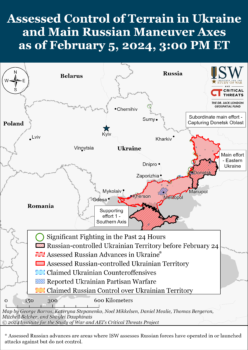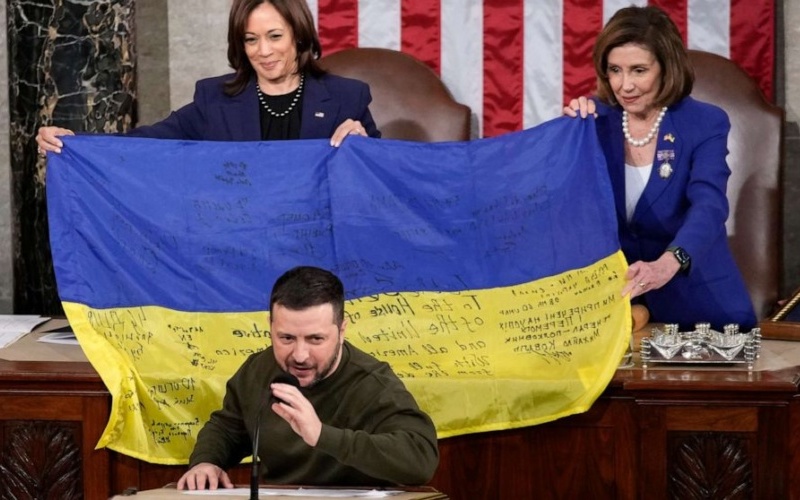Vice President Kamala Harris and House Speaker Nancy Pelosi hold up a Ukrainian flag from the frontline as Ukraine President Volodymyr Zelenskiy addresses the US Congress, December 21, 2022 (Carolyn Kaster/AP)
Monday’s Coverage: Zelenskiy Points to Replacement of Senior Officials

Map: Institute for the Study of War
UPDATE 0740 GMT:
Writing for The Moscow Times, Elinor Harty highlights the case of Marc Fogel, a US citizen imprisoned in Russia since August 2021.
Fogel, a long-time sufferer of chronic back pain, was charged with trying to enter Russia with 0.6 ounces (17 grams) of medical marijuana. In June 2022, he was sentenced to 14 years in prison.
Harty was a student of Fogel’s at the Anglo-American School of Moscow, where he was a history teacher and softball coach. She writes of “his disarming smile”, “his infectious enthusiasm for living and learning, and “his affinity for storytelling, allowing him to weave seemingly random historical facts together to paint a picture of people and events that remain at the center of policy debates today”.
Fogel now teaches English to fellow inmates.
Harty summarizes:
Although drug use in Russia is a legitimate public health issue, Mark Galeotti notes that the state’s response has been “securitized” and “nationalistic”. Rather than prioritizing its citizens’ health, safety, and recovery, the government instead opts to use drug cases to target people that it perceives to threaten state power, from opposition activists to foreigners.
In Mr. Fogel’s case, it simply targeted someone who would be a useful political pawn, at the expense of a kind and talented teacher who dedicated the last ten years to educating children in Moscow.
UPDATE 0733 GMT:
Russian Railways says it is facing a shortage of locomotives that break down and are sent for repairs.
In its loading report for January, the company cites a lack of imported parts amid international sanctions over Vladimir Putin’s invasion of Ukraine. The situation “particularly worsened” in the fourth quarter of 2023.
The railways also have a shortage of personnel, with mass mobilization depriving the repair factories of their workforce.
UPDATE 0718 GMT:
Russian forces destroyed a three-story hotel in the town of Zolochiv in the Kharkiv region early Tuesday. Four civilians were trapped under rubble — two women and one man have been rescued but one person is still buried.
On Monday, at least 51 Russian attacks on the Sumy region in northern Ukraine killed one civilian and injured eight.
ORIGINAL ENTRY: Negotiators in the US Senate have presented a bill authorizing $60 billion in aid for Ukraine’s resistance of the 23 1/2-month Russian invasion.
The legislation includes $19.85 billion for replenishing weapons and equipment from the Department of Defense inventory; $13.8 billion for the purchase of weapons and munitions for Ukraine from US manufacturers; $14.8 billion for military training, intelligence sharing, and other support activities; and $1.6 billion in foreign military financing.
There is $7.85 billion of direct budget support and $1.58 billion to support self-reliance in the Ukrainian economy, and allocations of $300 million for the rule of law and border protection and $100 million for demining, counter-terrorism, and non-proliferation programs.
The bill also contains $14.1 billion for Israel and, in a compromise with Republicans demanding strict measures for the US-Mexico border, about $20 billon for new enforcement measures.
Hard-right House Speaker Mike Johnson, who was put into power by Trumpists last autumn, immediately declared that the bill would be “dead on arrival” in the lower chamber. He said that he would introduce separate legislation with aid only for Israel.
The Office of Management and Budget said on Monday that President Joe Biden would veto any standalone bill: “The Administration strongly encourages both chambers of the Congress to reject this political ploy and instead quickly send the bi-partisan Emergency National Security Supplemental Appropriations Act to the President’s desk.”
The Trumpists Hold Ukraine Hostage
A faction in the House, made up of Trumpists and other hard-right representatives, initially blocked $60.6 billion for Ukraine — as well as assistance for Israel, Taiwan, and the Asia-Pacific region — last October. They forced out Speaker Kevin McCarthy and ensured the succession of Johnson, a little-known member from Louisiana.
The group initially demanded that assistance to Kyiv be linked to draconian measures against migrants and asylum-seekers.
However, as the Senate negotiators neared their compromise, the faction rejected any bill. The attack site Breitbart demanded retribution against any Republican Senator voting for the legislation.
Critics said the hard-right cabal was now pursuing an indefinite blockade, effectively blackmailing Ukraine, to support Donald Trump’s campaign to return to the White House.
Trump unwittingly supported that claim with an intervention on Monday blasting the bill.
This is a gift to the Democrats. And this sort of is a shifting of the worst border in history onto the shoulders of Republicans. That’s really what they want. They want this for the presidential election so they can now blame the Republicans for the worst border in history.
WOW: Speaker Mike Johnson and Laura Ingraham mock and laugh at the Border Patrol Union on Fox for their support of the border bill [WATCH] https://t.co/dv0xUGR5Aa
— MeidasTouch (@MeidasTouch) February 6, 2024
Sen. Kyrsten Sinema, one of three legislators who crafted the compromise, responded by emphasizing the severity of the measures against migrants and asylum seekers.
I think there’s some real misunderstanding about this section of the law. The Border Emergency Authority is actually a really critical element….
We expand detention beds so that those individuals will go into detention, be processed, and deported right away….
Little kids who are here alone, families; we’re not allowed to keep them in detention. And so, we create a new system for them where we keep them under supervision. And then we have a very short period of time in which we determine if their asylum claim is valid or not, and then deport them out of the country.

